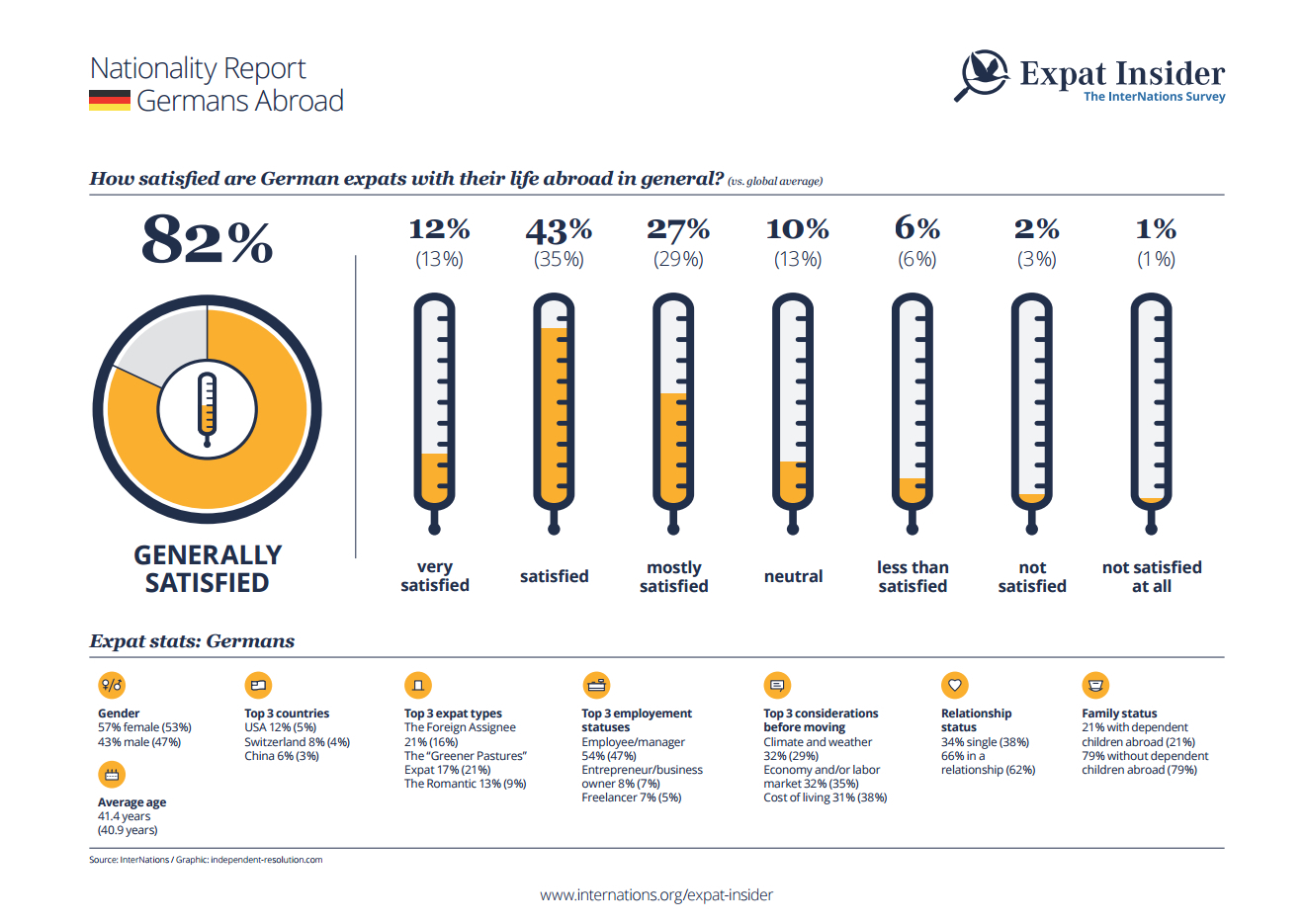Germans Abroad
Abroad are German German residing outside the Federal Republic of Germany. In Europe alone, there are 1.14 million foreign German, mostly in Switzerland and Spain (2010 ).
Term core and Begriffshof
German abroad in the strict sense of the word are German nationals without permanent residence in the Federal Republic of Germany. Larger groupings of such persons currently living in Switzerland, Austria and Luxembourg. Occasionally still ethnic German without German citizenship are referred to as foreign German today. This German are meant who in other States their home, especially as a long resident German minority, with the nationality of the country in which they live, such as German in Northern Schleswig ( Denmark).
Terms of Use
The relocation of the principal residence abroad, while maintaining the German nationality brings some consequences. These include:
- German, are not subject to German reporting obligation and mainly staying abroad are not subject to the disclosure requirements, that is, they are not required to possess an identity card or passport. However, in many cases, such a document is needed. For example, a passport or an acceptable replacement document must be carried (eg ID card) and presented at a border control world when crossing the border. This also applies to German citizens who travel to Germany or from Germany. Depending on the country of residence may also need a visa in the passport to be entered, for which purpose the possession of a current document is required. For the issuing of passports, the German authorities abroad, living in the consular district of the German abroad. Such representation may be an Embassy or Consulate General. In honorary consulates requesting is usually not possible, but in many cases, the technical conditions have been created there. To handle the jurisdiction rules in practice citizen-friendly, ( 19.4.1 Clause ) is specified that passport applications expatriate German by passport authorities to adopt domestically, regardless of their own lack of competence and are to be processed after obtaining the authorization required in the passport management, provision for a important reason is explained. Another important reason, if, for example, if the claimant argues that the way to pass competent authority is considerably further than the incompetent passport authority.
- An ID card may also be requested by persons not resident in Germany. The application can be carried out at German missions since 1 January 2013. However, the competent representation is not necessarily the same as for passports, since not every foreign representative is also a passport authority. The country of residence is indicated on the card that the holder is not domiciled in Germany. The costs are significantly higher than those in the domestic as a foreign surcharge of 30 Euro will be charged. Since this supplement is higher than the fee for the card itself, the cost of applying abroad more than twice as high as in Germany (June 2013). By late 2012, there was only the option of applying at any local passport authority in Germany. Prior to November 1, 2010, the countries were also responsible for the issuing of identity cards, not the federal government, which often caused difficulties with applying with you.
- In federal elections may abroad German since May 3, 2013 Only choose, if they have lived for at least three consecutive months in the Federal Republic of Germany either after completion of their 14th year and this stay for no more than 25 years or if they personally for other reasons and directly have acquired familiarity with the political situation in the Federal Republic of Germany and are affected by them. German abroad where this is not the case, have no right to vote in federal elections. The previous scheme was declared in July 2012 to be unconstitutional, so that in the meantime there was no legal basis for the right to vote from abroad Germans. German abroad can register on the electoral roll of their last residence constituency and vote by absentee ballot. Abroad German, who have never had a residence in Germany, have their constituency at the centroid of their personal concern German of the political situation in the Federal Republic of Germany, so their work at cross-border commuters, still the last home community of the ancestors in a straight line in the federal territory, or local staff foreign missions usually the Foreign Ministry and thus the Mitte District Berlin ( constituency 75).
- In European elections may cast their vote abroad German in Germany if they are resident in another country of the European Union and do not participate at the appropriate local election.
- German citizens living abroad, can be entered in the crisis prevention list of the " resident consular Germans and other protective Commanded and their family members " (also known as German List ), which leads the respective German mission abroad to for disaster preparedness.
History of the term
As part of the foundation of the German Empire in 1871, the meaning of the word " German " changed. For the first time a distinction was made between people who lived permanently in the German Reich, and those who have been resident outside its borders. The idea of the " Auslandsdeutschtum " formed a kind of substitute for the community, which had in Austria, as a German minority in their traditional areas or as settlers in the German colonies live outside the territorial nation borders. Often were even against their will people as " foreign German " counted on "Germanness " - so they talked about so-called border and remote Germans - who had finally emigrated for example, in the U.S. and acquired the citizenship of their new country and culture had assimilated, which at best were therefore still of German descent. "This nation was imagined, although de facto widely scattered and not contiguous, but she was nevertheless part of an integral, cultural imagination. [ ... ] The experience of a caesura and the deep divide between home and abroad was here combined with the belief that culturally and increasingly ethnically understood national identity could not be saved. "
This understanding was reflected in the change in the citizenship law of 1913. The German nationality was no longer automatically abroad lost after ten years, but could even be transmitted to offspring. The idea was that German emigrants ( the German colonies here were meant ) by staying in " New Germany " is no longer lost to the " body politic " but at any time to return to their " original home," the mother country Germany should.
As a " colonies " were both completely lost until 1919 overseas territories that were under German rule, as well as in the Middle Ages by Germans populated areas in Southeastern and Eastern Europe with a local or regional majority ethnic German residents. Sebastian Conrad concludes from the borders of the German state busting concept of ethnic Germans or the " ethnic Germans ": "Not later than the large number of ' ethnic ', which as a result of these provisions in the 1990s, mainly from Russia in the Federal Republic, returned ', the continuing social relevance of these statutory provisions and, generally speaking, the importance of the colonial legacy in German history demonstrated. "
By the Treaty of Versailles areas fell under the jurisdiction of victorious powers of World War 1. In these areas, living German one called generally as German border. At the Foreign Ministry, there were " Ribbentrop Bureau " no later than 1935, the Hess explicitly specified task of taking care of expatriate Germans (see Charles Fried Count Dürckheim ). 1936 Stuttgart was as awarded the honorary title of city of Germans abroad. There was the seat of the German Foreign Institute.
The application of the term abroad at German people without German nationality has fallen considerably since 1945. Even in the era of National Socialism, he was rather German citizens living abroad than on German people ( this term has been used since the 1920s and is now synonymous with the German people RELATED ) been applied.










